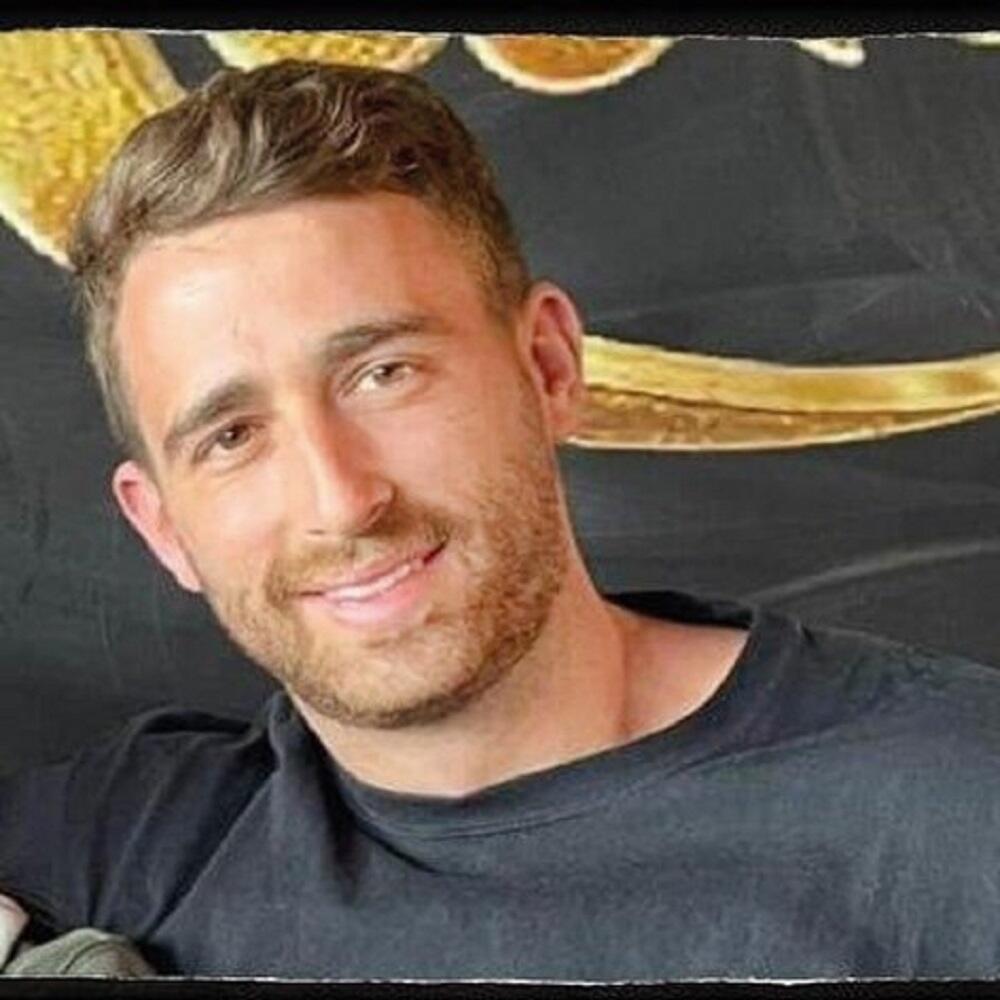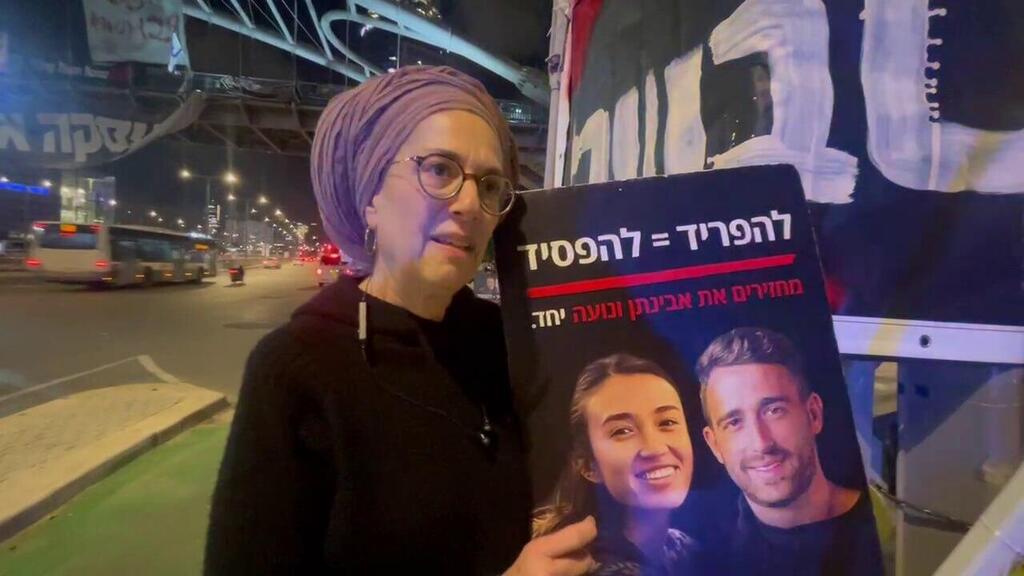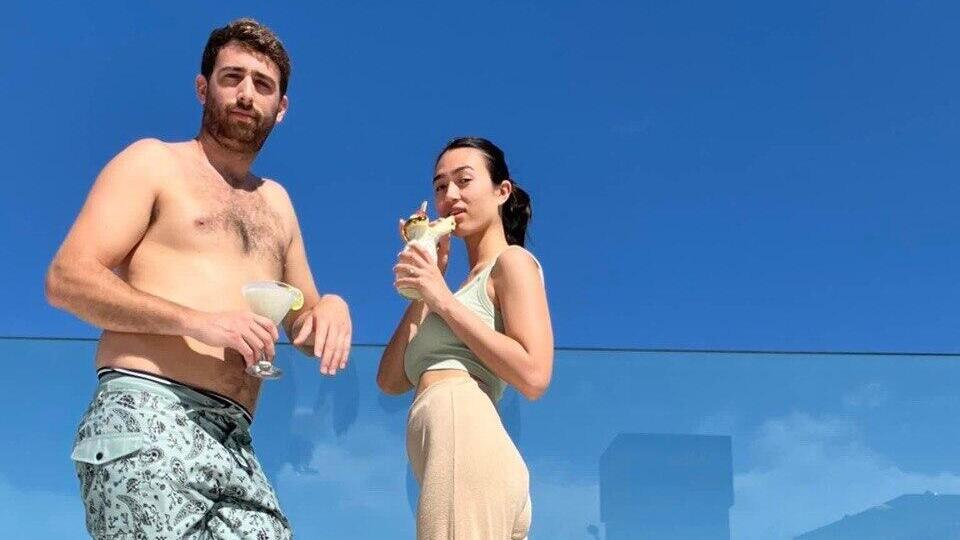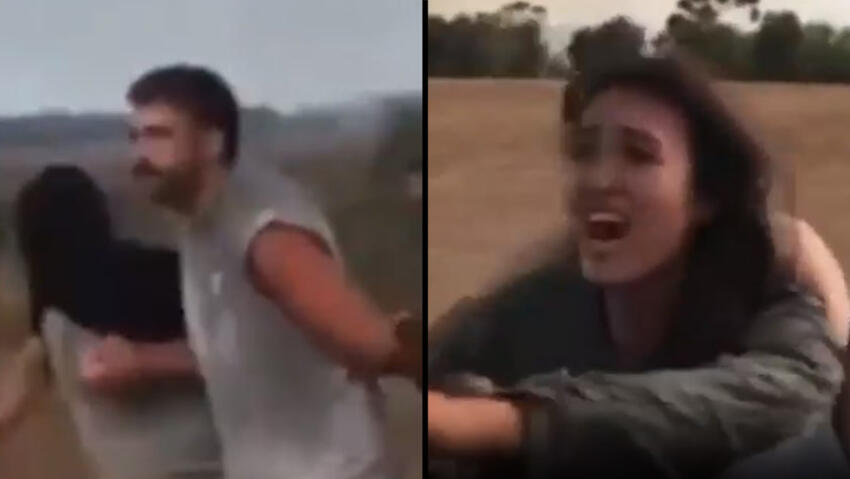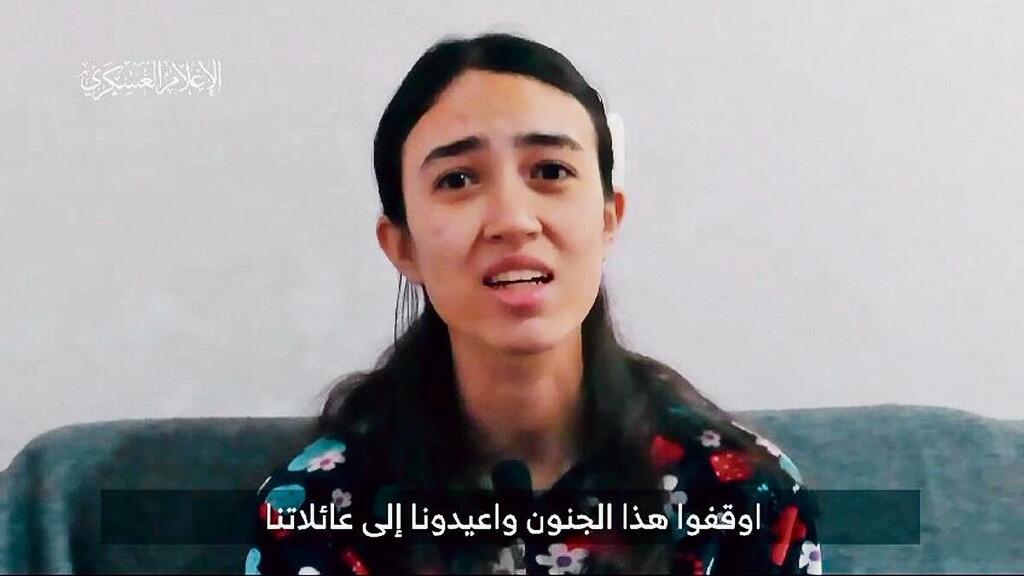Getting your Trinity Audio player ready...
On the couch of Ditza Or's lovely home in the southern Samaria area, there is an almost life-size cardboard poster of her son Avinatan. This is a picture taken in other times before he was kidnapped to Gaza, in which he looks tall and handsome with golden hair just like a movie star.
"He is such a handsome guy", I blurt out without much thinking. "Avinatan? Yes, he's a real hunk," she says smiling. Her smile testifies to the pride she takes in her successful son, who always excels in everything he does. Avinatan obtained a B.Sc degree in electrical engineering and was immediately accepted to work in the development team of a huge multinational corporation "Nvidia". But it's also the little things he would do that always came out as beautiful and accurate as possible. Like the library he built by himself for his mother or the cake he baked for her last birthday. "It was an amazing cake, a lemon pie with pistachios. A cake at the level of a pastry chef that he baked without studying, he learned everything from the internet and friends."
Again, she smiles, entirely pleased with her child, a smile which for a moment seems to lighten up, just a little bit, the darkness that lurks in her heart. The darkness that she fights with great courage, as it's been almost seven months that Avinatan is in Hamas' captivity. Ditza and Yaron, the father of her children who lives apart from her, do not have the slightest bit of information about what is happening to him there.
"All we have is the video in which he is seen kidnapped together with Noa, and there he looks safe and sound," Ditza says; "unfortunately, from the testimonies of people who were released we learned that once they reached the depths of hell, there in Gaza, the terrorists separated men from women. Some of those who were released said that Noa was fine, thank G-d, but kept talking about Avinatan, as she was going nuts, not knowing what had become of him. None has seen Avinatan. We know nothing about him, not a single thing."
Noa is of course Noa Argamani, Avinatan's sweetheart and partner for two years. Everyone recognizes Avinatan and Noa from the video of their kidnapping, which became one of the prominent symbols of October 7. This horrible video turned them into the Romeo and Juliet of the war, two beautiful young people and so much in love who were being abruptly and forcefully separated from each other. It is not surprising to learn then that all Noa is concerned about in captivity is Avinatan. This kind of love story should have a happy ending.
The truth is that I'm quite relieved that Ditza mentioned Noa because I didn't feel so comfortable asking about her and their love story. Avinatan is a young man who was kidnapped, one of the dozens of men still held captive by Hamas, and there is a feeling that these men were relegated to the bottom of the list in terms of public awareness. We are too busy feeling sorry for the poor girls still held captive there. What draws most of the attention are stories, very prying ones, one must admit, about sexual abuse and harm. That's why by coming here, I was resolute to give Avinatan's story the respect it deserves. They say that women and children should come first, but he is also a child, he is Ditza's precious child.
Ditza is a very smart and sensitive woman, and she understands that I am here also to hear about Noa and their relationship. And indeed, although there is no picture of her here, I must say that Noa is very present in the house, like a silent scream. Where are Avinatan and Noa? Why aren't they sitting here together with Ditza, holding hands, drinking the delicious herbal tea she made from the herbs in her flowerbeds, laughing with her, talking about their plans for a shared future?
And what is even more painful is that Ditza has not yet met Noa. Avinatan and Noa got acquainted at Ben-Gurion University; they didn't study in the same class and yet fell head over heels in love and have been inseparable since. "I was waiting to see if their relationship was getting serious," Ditza says. Ditza is a religious observant woman, who has lived in the settlement of Shilo located between two green mountains for 28 years; she wanted to meet Noa when it was clear that that their relationship would lead to marriage. "Last November, they were supposed to move in together in Tel Aviv," she says, "I told him, 'Bring her here, let's move forward,' and we were trying to set a date for us to meet. But things didn't work out because Noa had to study for an exam and then she went abroad, but it was clear that this was going to happen very soon."
Today it seems so far away, but Ditza says that back then it was important for her, as a religious woman, that Avinatan would bring Noa to meet his mother only when they were planning to get married. On the other hand, Ditza didn't try to force him into anything. She is a very open-minded and caring person; in her professional work, she serves as an emotional and spiritual counselor. She teaches Hasidic Judaism and Spiritual studies and conducts workshops on Jewish awareness in the spirit of the Ba'al Shem Tov doctrine, but she has no problem talking about horoscopes and astrology as well. "I wanted to see him settled down, but I also let him live his life freely with love. I didn't want him to submit to my will, but rather feel free to choose his path."
Avinatan took off his kippah around the age of 19. "He graduated Yeshiva high school in Jerusalem, Nativ Meir, followed by another year of Yeshiva in Hebron, and towards the end of his studies there, he decided not to wear his kippah anymore."
Didn't it bother you that he led a secular life? Living in Tel Aviv, working in high-tech, hanging out?
"Absolutely not. I call Avinatan 'my searching boy', and that's fine because I'm also searching. And each one is at a different stage in the search. Avinatan is looking for truth and love. He found love, and he's still exploring for the truth, and that's perfectly fine for me. In general, the distance between us is not mental, but rather spiritual; we are very close and connected mentally, and there is great love between us. As a mother, it's fine if we have a heart talk. I allow him to follow his self-quest."
Avinatan is the second of her seven children. Three of them are already married with children, and she is a grandmother of nine grandchildren. "At first, when it (the kidnapping) just happened, all my children came here and slept over. The house was full. I call it the 'madness period', and the truth is that I don't really remember any of it. Everything is vague to me, blurry, what I ate, what we talked about."
But that period is over, and now, after too many months, she, like most of the hostages' mothers, is in the second stage of anticipation. She sits at home alone, and she has a lot of quiet and a daily routine, but in practice, it's not clear which stage is more painful. A pain like Ditza's cannot be normalized. Everything that screams in her still screams and even sounds louder with the calm that surrounds the house and the sound of the ticking clock. "Even hell has shades," she said earlier, "this is what I've learned from this difficult time. There is a section of hell that you can live with and there is a deeper one, there is one kind of fire and there is another kind of fire. Hell is not monolithic, it's not just one thing. There are floors, shades, and styles. Take, for example, the hell of the parents of Noa, who is an only child. First of all, she is a daughter, a female, which is scary in itself, and second, she is the only child they have. And her mother, who suffers from advanced head cancer, makes it another shade of hell. I just don't understand why it involves so much suffering. It's such a big question - why does one have to go through so much darkness to get to the light? I live with this question and continue to love Hashem (G-d) albeit this question."
Moments of kidnapping Noa and Avinatan, as taken by Hamas terrorists
Ditza didn't know about the Nova music festival in Re'im to which Avinatan went with Noa. "Usually he calls me on Fridays, telling me about his week, and things he is planning to do. With this sweetness in mind, I go to light Shabbat candles. That specific Friday he didn't call, which was fine with me because we saw each other the day before. And not only did I not know he was going to the party - but I also didn't know such parties existed in the country. Only later I saw videos of them dancing at the party before the attack, and I was amazed. Wow, what beautiful and glamorous children and how they dance freely, what a huge party setting and what an investment"!
Did you have a sense of foreboding, a presentiment?
"No, I had no maternal gut feeling that something was going on, I was at my mother's in Jerusalem. When the first rocket siren blared, I was asleep. Even when I got up and heard sirens in the distance, we said to ourselves, 'Well, there must be a failure in the alarm system.' We didn't turn on our phones, nor did we go to the shelter. We didn't have a sense of Pikuach Nefesh, that we were in critical danger."
So, the war started, and you had no idea?
"My mother uses the service of an Indian foreign worker, so he turned on the phone and started telling me what was going on. That's how we realized something serious was happening. But we continued as usual. Prayers, feast day meals. A holiday. Slowly news began to flow, about the terrorist infiltration in Ofakim, and the savannah vehicles that came in. And in between he told me about a party that was held in the Gaza surrounding area and the terrorist attack. I was in shock. I was worried about my people and the country, but I didn't connect it to Avinatan. My son lives in Tel Aviv, what's he got to do with it? I was such an ignorant. Imagine that I even went to take a nap. Around 2 pm I got into bed and fell asleep and woke up to the knocking on the door. While I was asleep, I heard footsteps on the path leading to my mother's house and for some reason, the footsteps caught my ear. I heard them. When they knocked on the door, I said to myself, 'No, I'm not opening the door.' I can't even explain why. Then there was another knock, and another one until the foreign worker opened the door. Then I heard the voice of my daughter, Tomer Dvorah, and I thought to myself, 'Okay, something is wrong here'. Still, I didn't open the bedroom door."
I can relate to that; I wouldn't want to know either.
"This is the part that I don't like to tell. I stayed on the safe side of the door, and they - my daughter, my son Chaimitz, and the employee - were on the other side; they knocked on my door, and I refused to open it. Finally, my daughter opened the door, and I remember looking at her. The community psychologist also came with her, I know him, and I understood. My daughter said, 'Mom, there was a terrorist attack, a war broke out and Avinatan was kidnapped.' She said it plain and simple. Should I tell you how shocked I was? I was devastated. And what does it mean 'kidnapped'? It's a word we never used. And I remember saying just one sentence, over and over again: 'No, not Avinush, just not Avinush.'
"They say that after a terrorist attack, g-d forbid, there is deathly silence. No one screams, there is a moment when the whole world is silent. And that's what happened to me when I realized that my son had been kidnapped. It's like a terror attack inside the soul and silence. Even after I heard the news, I stayed at my mother's until Shabbat ended. I sat and waited three hours for Shabbat to end and for Havdalah. I remember being thirsty like I'd never been before. I sat on a chair, not even on a couch, and tried to process it. What does it mean, 'kidnapped'? Kidnapped where? I remember asking my daughter, 'But why did you come now? Why didn't you wait for Shabbat to end? What can I do with this news now? What's the use of desecrating Shabbat?'"
After a while, they told her it was evident. A friend of Avinatan found the kidnapping video there. "What a professional video he got," she says, and anger lights up in her expressive eyes, "that's a piece of directing, huh?"
I completely understand why she is angry. These devilish terrorists took the most horrible moment of her son's life and turned it into a stylish propaganda production. They didn't care that the 'actors' didn't want to be there, that they were suffering from indescribable terror while the terrorists were adjusting the focus of their camera lenses. You see Noa there, sitting on a motorcycle like a beautiful princess, extending a miserable hand forward and her face contorted with pure fear and sorrow. 'Avinatan', you can read her lips screaming even though there is no sound in the film, 'Avinatan', and your heart completes the sentence - don't leave me with these monsters alone. And while she disappears from the frame, we see Avinatan walking beside her in the field. Four terrorists surround him and force him at gunpoint to keep walking. Avinatan wants to escape from them, to run and save Noa, it's so evident in every furious tremor that goes through his arm muscles, and in general, as his mother said, Avinatan is a cavalier, he's a soldier and a gentleman, if only he could, he would punch them.
"It's even more than Romeo and Juliet," Ditza says, "Avinatan's love for Noa dictated all his decisions. You know, I was told that he had opportunities to escape. He's the type of guy who knows how to do it, he's well trained. But he stayed there to protect Noa and decided not to abandon her. He followed her so that she would not be left alone. He followed his beloved into captivity."
I'm going out to Ditza's balcony, where she stands every morning and performs her regular morning ritual since her son was kidnapped in Gaza. At first, she prays and reads Tehillim (psalms) and then she opens the gate of her soul and lets in all the darkest fears. "It's very easy to get despaired," she explained earlier, "despair is available to me. It's constantly lurking around the corner and if I just let go a little, immediately all the worst images start to float in my mind. Images of the tunnels, of what's in there, of Avinatan and what is being done to him; I don't even want to put it into words. So I let myself feel it - but only until 11 am. Not more. Then I close the door to all the dark fears and concentrate on faith, on believing, on being strong."
Ditza calls her fears "her mental terrorists". Just like terrorists, they penetrate the soul and cause deadly havoc. "Despair is dangerous for us," she says, "it's like going on a hike and getting lost. You won't stay down there, in the dark valley, and give in to fear. You'll go up, to the highest mountain you can find, and look out from there. That's what I try to do. You know, G-d is also a king, our father, a spouse, and he is also a friend. The best friend. So I'm not exactly mad at him, but I do say to him, 'What have you done to us? That's not how you behave between friends."
Ditza is no stranger to sadness. But it's funny, she says, because her name is Ditza Tirtza. Ditza, which means joy in Hebrew, and Tirtza, which means something you want. Both are happy names. So, it's either your name reflects who you are, she says, or your name embodies Tikun. And now she of all people, was put to the greatest test a mother could have. "There is something I would say to my children when they enlisted in the army. I would tell them, 'Good luck, choose whatever path you want, but always, in any situation, I don't allow you to be a hostage.' And I mean they can choose all, death too, just don't be a prisoner. Because being a prisoner is the worst of all conditions. They take your life, and you have no control whatsoever, they can do anything to you."
And now you are living your greatest fear.
"Yes, exactly. But today I would say things a bit differently. I can say that Avinatan has his inner world even when everything was taken from him. I believe in the strength he has inside him. You know, at first, I couldn't watch the video of their kidnapping, it took me a week to watch it. But when I did, I saw his power. I saw him walking upright, beautiful, all those next to him are dwarfs. They are small and they are vile, and they are despicable. There is no connection between him and them in terms of qualities."
Eventually, because of the kidnapping, it turned out that she got to meet Noa's parents before she met Noa. "The meeting was held in Tel Aviv, and I immediately connected with them. Liora is amazing and Yaakov is a warm and charming man. He and Liora love Avinatan very much. They told me that from the beginning they started calling him 'our son-in-law'. They accepted him as a son. They want to see them married. Noa's mother wants to see them back home, but then she has another dream, to stand at their wedding, reassured. They were kidnapped together, and they need to come back together, that's it, and that's what we're waiting for."
Did you watch the new videos of Noa that the scums posted?
"I saw Noa's first video, but not the second. The first is a 'clean film', so-called, they only talk there, so I could watch it. I looked at Noa and felt that I really, really love her. I can’t wait for her to return, to be in a protected and guarded place where she can be hugged, and told that everything is fine. She will come here with G-d's help, she and Avinatan, will stand here in this living room and hold hands."


